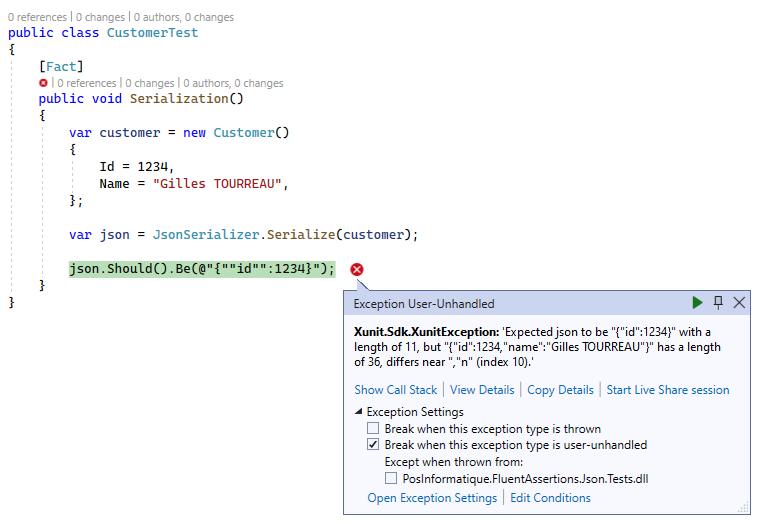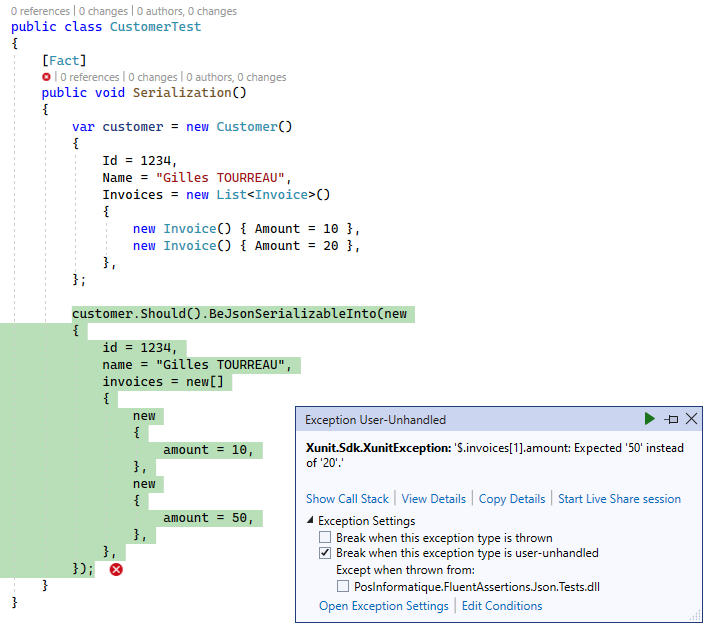PosInformatique.FluentAssertions.Json
PosInformatique.FluentAssertions.Json is a library to assert JSON serialization using the Fluent Assertions library style coding.
Installing from NuGet
The PosInformatique.FluentAssertions.Json
library is available directly on the

To download and install the library to your Visual Studio unit test projects use the following NuGet command line
Install-Package PosInformatique.FluentAssertions.Json
How it is work?
Imagine that you have the following JSON class:
public class Customer
{
[JsonPropertyName("id")]
[JsonPropertyOrder(1)]
public int Id { get; set; }
[JsonPropertyName("name")]
[JsonPropertyOrder(2)]
public string Name { get; set; }
[JsonPropertyName("gender")]
[JsonPropertyOrder(3)]
public Gender Gender { get; set; }
}
public enum Gender
{
None = 0,
Male = 100,
Female = 200,
}
With the following instance:
var customer = new Customer()
{
Id = 1234,
Name = "Gilles TOURREAU",
Gender = Gender.Male,
};
You would like to check this class is serializable into the following JSON object:
{
"id": 1234,
"name": "Gilles TOURREAU",
"gender": 100,
}
Using standard assertions you should write the following code :fearful::
[Fact]
public void Serialization()
{
var customer = new Customer()
{
Id = 1234,
Name = "Gilles TOURREAU",
Gender = Gender.Male,
};
var json = JsonSerializer.Serialize(customer);
json.Should().Be("{\"id\":1234,\"name\":\"Gilles TOURREAU\",\"gender\":100}");
// Or
json.Should().Be(@"{""id"":1234,""name"":""Gilles TOURREAU"",""gender"":100}");
}
With the following kind of exception when the unit test is incorrect:

As you can see the previous code is not sexy to read (and to write!) and the exception is hard to understand…
Test the serialization of a .NET Object to a JSON object.
With the new fluent style using this library you can write previous unit test like that:
[Fact]
public void Serialization()
{
var customer = new Customer()
{
Id = 1234,
Name = "Gilles TOURREAU",
Gender = Gender.Male,
};
customer.Should().BeJsonSerializableInto(new
{
id = 1234,
name = "Gilles TOURREAU",
gender = 100,
});
}
And when an exception is occured, the exception message contains the JSON path of the property which is error:

Since the version 1.6.0 it is possible to use a raw string literal with a JSON content in the string:
[Fact]
public void Serialization()
{
var customer = new Customer()
{
Id = 1234,
Name = "Gilles TOURREAU",
Gender = Gender.Male,
};
customer.Should().BeJsonSerializableInto(
"""
{
"id": 1234,
"name": "Gilles TOURREAU",
"gender": 100
}
""");
}
Test the deserialization of a JSON object to a .NET Object
You can in the same way test the deserialization JSON object into a .NET object.
[Fact]
public void Deserialization()
{
var json = new
{
id = 1234,
name = "Gilles TOURREAU",
gender = 100,
};
json.Should().BeJsonDeserializableInto(new Customer()
{
Id = 1234,
Name = "Gilles TOURREAU",
Gender = Gender.Male,
});
}
Since the version 1.6.0 it is possible to use a raw string literal
with a JSON string content as input of the Should() to assert:
[Fact]
public void Deserialization()
{
var json =
"""
{
"id": 1234,
"name": "Gilles TOURREAU",
"gender": 100
}
""";
json.Should().BeJsonDeserializableInto(new Customer()
{
Id = 1234,
Name = "Gilles TOURREAU",
Gender = Gender.Male,
});
}
Test polymorphism serialization with property discriminator
With the .NET 7.0 version of the System.Text.Json it is possible to serialize and deserialize JSON object
with property discriminators for polymorphism scenario
(See the How to serialize properties of derived classes with System.Text.Json)
topic for more information.
It is possible also to use the polymorphism JSON serialization with previous version of .NET using a custom
JsonConverter. See the How to serialize properties of derived classes with System.Text.Json (.NET 6.0) for more information.
Imagine you have the following classes hierarchy:
[JsonPolymorphic(TypeDiscriminatorPropertyName = "type")]
[JsonDerivedType(typeof(ThreeDimensionalPoint), typeDiscriminator: "3d")]
private class BasePoint
{
[JsonPropertyOrder(1)]
public int X { get; set; }
[JsonPropertyOrder(2)]
public int Y { get; set; }
}
private class ThreeDimensionalPoint : BasePoint
{
[JsonPropertyOrder(3)]
public int Z { get; set; }
}
And you would like to assert that the serialization of ThreeDimensionalPoint instance generate the following JSON content
when calling the JsonSerializer.Serialize<T>() method with BasePoint as generic argument:
var point = new ThreeDimensionalPoint()
{
X = 1,
Y = 2,
Z = 3,
}
var json = JsonSerializer.Serialize<BasePoint>();
{
"type": "3d",
"X": 1,
"Y": 2,
"Z": 3,
}
This is the assertion to write using the PosInformatique.FluentAssertions.Json library:
point.Should().BeJsonSerializableInto<BasePoint>(new
{
myType = "3d",
X = 1,
Y = 2,
Z = 3,
});
NOTE: If you don’t specify the
BasePointgeneric argument, the library will use the default behavior of theJsonSerializer.Serialize()(with no generic argument), which will generate (and assert!) the following JSON object:{ "X": 1, "Y": 2, "Z": 3, }As you can see there is no discriminator property generate because the .NET
JsonSerializer.Serialize()will use the type of the instance instead of an explicit type of derived class.
Change the JsonSerializer options
Change globally the JsonSerializer options
The JSON serialization and deserialization assertions use the default instance of the
JsonSerializerOptions.
It is possible to change globally this default options by accessing to the static instance
of FluentAssertionsJson.Configuration.JsonSerializerOptions.
For example, if you use xUnit test engine and you want to apply the JsonStringEnumConverter
for all the unit tests in the PosInformatique.JsonModels.Tests, create the following
xUnit extensions class and apply the assembly XunitTestFrameworkAttribute to reference this class:
[assembly: TestFramework("PosInformatique.JsonModels.Tests.JsonModelsTestFramework", "PosInformatique.JsonModels.Tests")]
namespace PosInformatique.JsonModels.Tests
{
using System.Text.Json.Serialization;
using PosInformatique.FluentAssertions.Json;
using Xunit.Abstractions;
using Xunit.Sdk;
public class JsonModelsTestFramework : XunitTestFramework
{
public FunctionsTestFramework(IMessageSink messageSink)
: base(messageSink)
{
FluentAssertionsJson.Configuration.JsonSerializerOptions.Converters.Add(new JsonStringEnumConverter());
}
}
}
Defines the JsonSerializer options specifically on an unit test.
It is possible when calling the BeJsonSerializableInto() and BeJsonDeserializableInto() methods
to specify the JsonSerializerOptions used for the serialization and deserialization process
during the assertion.
For example, to use the JsonStringEnumConverter to serialize the enum into a string value:
[Fact]
public void Serialization()
{
var customer = new Customer()
{
Id = 1234,
Name = "Gilles TOURREAU",
Gender = Gender.Male,
};
var options = new JsonSerializerOptions()
{
new JsonStringEnumConverter(),
};
customer.Should().BeJsonSerializableInto(new
{
id = 1234,
name = "Gilles TOURREAU",
gender = "Male",
},
options);
}
[Fact]
public void Deserialization()
{
var json = new
{
id = 1234,
name = "Gilles TOURREAU",
gender = "Male",
};
var options = new JsonSerializerOptions()
{
new JsonStringEnumConverter(),
};
json.Should().BeJsonDeserializableInto(new Customer()
{
Id = 1234,
Name = "Gilles TOURREAU",
Gender = Gender.Male,
},
options);
}
Changes the global JsonSerializerOptions for a specific assertion.
It is possible to changes the global FluentAssertionsJson.Configuration.JsonSerializerOptions
for a specific assertion using a configuration lambda expression.
For example, if you have defines globally the JsonStringEnumConverter converter for all the unit tests
(see the previous examples), but you would like to remove the existing converter in the specific unit tests:
[Fact]
public void Serialization()
{
var customer = new Customer()
{
Id = 1234,
Name = "Gilles TOURREAU",
Gender = Gender.Male,
};
customer.Should().BeJsonSerializableInto(new
{
id = 1234,
name = "Gilles TOURREAU",
gender = "Male",
},
opt =>
{
opt.Converters.Clear();
});
}
[Fact]
public void Deserialization()
{
var json = new
{
id = 1234,
name = "Gilles TOURREAU",
gender = "Male",
};
var options = new JsonSerializerOptions()
{
new JsonStringEnumConverter(),
};
json.Should().BeJsonDeserializableInto(new Customer()
{
Id = 1234,
Name = "Gilles TOURREAU",
Gender = Gender.Male,
},
opt =>
{
opt.Converters.Clear();
});
}
NOTE: The lambda expression allows to update the global
FluentAssertionsJson.Configuration.JsonSerializerOptionsinstance during the call of theBeJsonSerializableInto()orBeJsonDeserializableInto()methods. Global previousJsonSerializerOptionswill be restored at the end of the assertion.
Library dependencies
-
The PosInformatique.FluentAssertions.Json library target the .NET Standard 2.0 and can be used with various of .NET architecture (.NET Core, .NET Framework,…).
-
The PosInformatique.FluentAssertions.Json library use the 5.0.0 version of the System.Text.Json NuGet package and can be used with old projects that target this library version and earlier.
